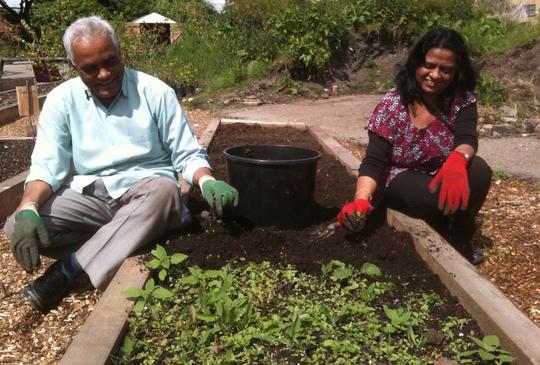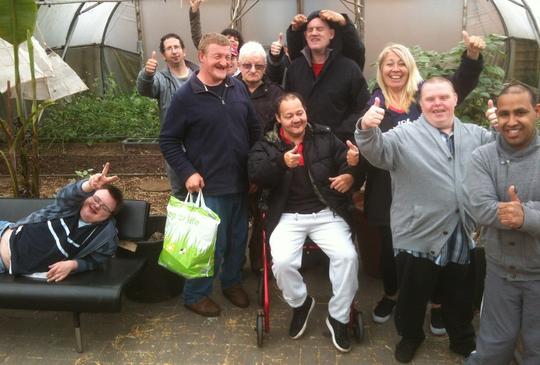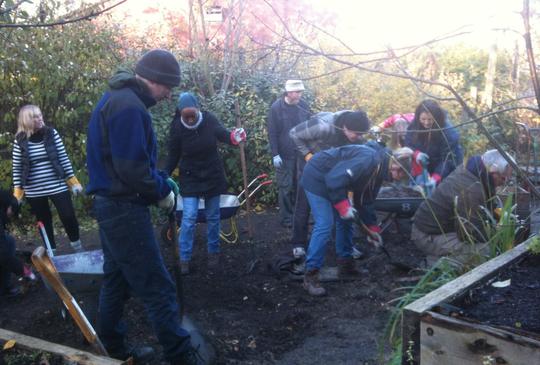
Hulme Community Garden Centre
Rachel Summerscales is the Centre Manager of Hulme Community Garden Centre, a community-led garden project in the heart of Hulme, close to the centre of Manchester. "My job is to manage the Centre, the staff and staff development and to raise funds”, she explains.
She started in February 2014, but her association with the Centre goes back many years and includes a spell as interim manager “about eight years ago” and regular management consultancy, often on financial matters. That experience and her background in urban agriculture (she got involved in it shortly after graduating from university in 1994) is proving invaluable.
One of the main challenges at the moment is balancing the books. “We’ve been losing money for a couple of years”, she explains. “So we need to get our revenue streams sorted out and be more business-like.” She tells me that it won’t be easy. “I’m wondering whether I might regret taking the job on part-time”, she laughs, recalling that it was advertised as a full-time post. So I ask her why it needs to be done and we get talking about the Centre.

Hulme Community Garden Centre, she tells me, was established in 2000 on wasteland, opposite Homes for Change, a local housing co-operative, on Old Birley Street. Its presence in Hulme highlights the continuing strength of the local community sector and its multi-cultural ethos.
The area is also home to the African Caribbean Care Group at Claremont Resource Centre; Z-arts, the arts and creative hubs for young people in Manchester and Manchester Veg People, a co-operative of local organic growers and restaurants.
The Centre has two main objectives. It grows plants in its environmentally-friendly nursery for sale to the public on-site and it gives people an opportunity to learn about and enjoy gardening, either on-site, in its community garden and Eco-classroom – “the first straw-bale building in Manchester” – or off-site, via various gardening projects for local schools and other clients, such as Elizabeth Gaskell House.
“It’s a simple formula - plants and people”
The focus, Rachel says, is very much on people and their needs. “Customers can talk to staff and volunteers who are knowledgeable. And they can go and see our big community garden.” But, she says, they need to attract more people from the local community. “We do a Parent and Toddler Group on a Thursday morning. But they are mostly middle-class parents and tots from Chorlton. I think the local mums are put off by the hippy ethos. So we are trying to push the food angle, because a lot of local people grow food on their balconies and a lot of ethnic minority people come to buy specific seeds, gourds, spinach, chillis.”
The people-centred ethos is also embedded in the operation of the Centre. Although it has nine staff, a lot of the work is done by volunteers. Some of them “simply volunteer their time”; but many are public service users, for whom volunteering is either a pathway to work, a way to address mental and physical health problems or an opportunity to mix with other people. That, Rachel tells me, is where the Centre is particularly successful.
“It’s a simple formula - plants and people”, Rachel explains. “It’s not rocket science. There are loads of studies about how being outside and working with nature and getting your hands in some soil is massively beneficial to mental health. You can do something and you can see something happening. And I think that is something that is lacking in a lot of people’s lives.”

Unfortunately, the circumstances of many service users make it difficult for them to realise the benefits of gardening. Many of them, Rachel explains, have a sub-threshold disability. “They are not deemed to have a big enough disability to be paid by the state, but they struggle to get paid work. When they start working with us, you can see that they are improving and they start looking for jobs and they are a little bit more confident. Now the government is talking about making them sign on every day. That would be disastrous. The extra cost and time spent traveling back and forth every day to sign on would really set them back.” So the Centre is looking to expand locally, onto adjacent land, and continues to support the movement for urban agriculture across the city-region.
In the short-term, however, the overriding challenge is to secure funding for core staff. Here, also, the policies of the government seem to be making it more difficult to realise the value of the Centre. “Many people assume that because we are a voluntary sector organisation our costs of provision would be low”, Rachel tells me; “but we need staff to support our volunteers, especially our service users.”
The staff are important because they bring expertise and experience in managing the Centre and because they are “passionate about what they do and empathise with service users – some of them have had mental health problems themselves.” They are, she tells me, critical in realising the formula of plants and people. “I don’t think there will ever be a time when we don’t need core funding.”

Unfortunately, Rachel says, the challenge is getting harder, not easier, to address because funding models are moving “towards commissioning and payment by results” and away from core grants. The implication for the Centre is not ideal; but it is pragmatic and it is prudent. “We need to be more business-like; to get better at balancing the books, pricing work, securing funding and demonstrating returns,” she says. “If not, we’ll have a lot of other problems – in delivering services, investing in new facilities, keeping up with legislation, updating policies, training staff in health and safety, safeguarding vulnerable people, all that kind of stuff.”
One of the things that the Centre has done already is to secure a development grant from Tudor Trust to work with an academic on a tool that they, and other community organisations, could use to measure the social return on investments in people. But Rachel is under no illusions about the difficulty of such an undertaking. “It’s not like service users just come in and we put them through a course and six weeks later we go, “Look! Ta dah!” Some of our volunteers have been here for six years and we’ve only just seen an outcome.”
The Centre is also in the process of reviewing its own, internal governance. “The management committee are very passionate and altruistic; but they don’t have the right skills in business. So we [the staff] do most of the management work ourselves, which just adds to our workload. It’s a problem because most of us are part-time. We don’t have people whose job is HR. Our nursery manager does all the finance, which is nearly a full-time job.” And it is a problem because “there simply aren’t enough people with business skills in the local area who are prepared to join the committee.”
One option, she says, is to invite the current members of the committee to run working groups on various areas of management, such as health and safety, “rather than just come to the Centre once a month for two hours to attend a meeting.” Another option is to use digital management tools. “They can help”, she says, before pointing out a critical flaw. “We used PQASSO to do a quality assurance exercise. It’s a great tool. It came up with an action list. But every single action was for one member of staff. So all we did was massively increase her workload.”
Is there a lesson for other centre managers? Realising the potential of a community hub is about connecting people and connecting with people, in the target community, in the organisation, in the funding community and across those communities. For Rachel, that means empathising with service users, being more business-like and sharing the workload.
Head to the Hulme garden centre website for more info.
Acknowledgements
This interview is part of 'Realising the Potential of Community Hubs', a Greater Manchester Local Interaction Platform project.
Contributor Profile
Alex is a Researcher at the Centre for Sustainable Urban and Regional Futures (SURF). He is currently working full-time on the Greater Manchester Local Interaction Platform (GM LIP), one of 5 LIP set up by Mistra Urban Futures, an international centre for sustainable urban futures, based in Gothenburg. His main interest is in the socio-economics of sustainable urban transitions - specifically, the relationship between economic growth and social justice, and the ways in which local authorities engage with local communities.




